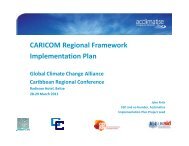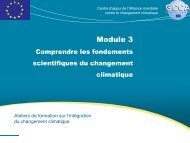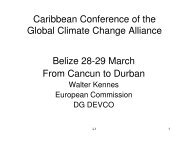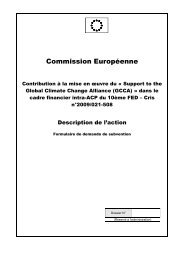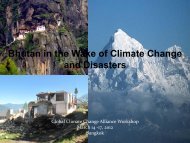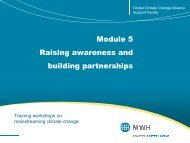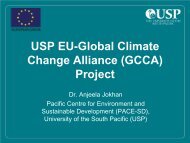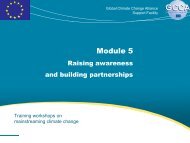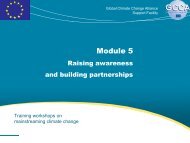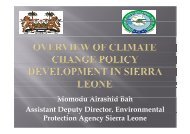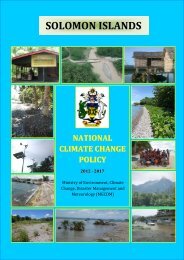Rwanda Green Growth Strategy 18nov11 - Global Climate Change ...
Rwanda Green Growth Strategy 18nov11 - Global Climate Change ...
Rwanda Green Growth Strategy 18nov11 - Global Climate Change ...
Create successful ePaper yourself
Turn your PDF publications into a flip-book with our unique Google optimized e-Paper software.
Detailed Programmes of ActionProgramme 14: <strong>Climate</strong> Data and ProjectionsResponsible Stakeholders (lead in bold)RMS, MIDIMAR, MINALOC, MININFRA, MOH, research organisations, District and Sub-District authoritiesSummary of Programmes and ActionsRobust observed climate data and climate projections for <strong>Rwanda</strong> are crucial to understand the futureimpacts of climate change, and to develop scenarios to assess the potential futures of <strong>Rwanda</strong>. Developingcapacity in climate science is necessary to underpin this work, as highlighted in the actions identified below. Action 1: Enhancing <strong>Climate</strong> Data CollectionThe recording and collection of climate data is predominantly the responsibility of RMS, with other stationsheld by MINAGRI and MOH. RMS is currently implementing a 5-year Strategic Plan, which includesinvestment into upgrading their network of meteorological stations. However, this network upgrade may notprovide the spatial density of information required for climate studies and for adaptation. Therefore, <strong>Rwanda</strong>will conduct an assessment of all existing and planned weather and climate data sources, in context of therequirements for climate studies and for early warning systems. Required additional observations will bearranged – to appropriate international standards – in collaboration with RMS and other relevant partners.This network will provide all climate information necessary for future monitoring, climate trend detection,management of climate variability, early warning and disaster management, and development of a weatherindex-based crop insurance industry. The information will complement historical data, and update historicalrecords and re-analyses. Action 2: Production of <strong>Climate</strong> <strong>Change</strong> Projections for <strong>Rwanda</strong>A team will be established to undertake processing and interpretation of climate model outputs for <strong>Rwanda</strong>.By using existing data, this action can be initiated quickly. Two example programmes with suitable data for<strong>Rwanda</strong> include General Circulation Models (GCMs) and Regional <strong>Climate</strong> Models (RCMs): CORDEX(COordinated Regional climate Downscaling Experiment) is an international collaboration to producedownscaled climate model information on a regional and national basis across the whole world, and will bereleased shortly. The focus will be on supporting vulnerability mapping in <strong>Rwanda</strong>, and on processingclimate model data in a user-friendly format so that it can be utilised by stakeholders in other sectors. Datawill be made available in a common format (Excel files, text files, etc), and both technical and non-technicalreports on projections will be produced. Action 3: Coordinating Capacity Building in <strong>Climate</strong> ScienceBuilding skills and expertise in climate science must be underpinned by appropriately trained staff. Whilecapacity exists in RMS and REMA, the long-term development of climate expertise in <strong>Rwanda</strong> requires acoordinated approach to bring through a generation of climate scientists and experts in adaptation andclimate policy. Developments are being made by REMA in secondary schools, and by KIST and NUR atuniversity level. The GoR will undertake a study to identify further needs for integrating climate science inschools, and ways of encouraging links between academia and <strong>Rwanda</strong>n institutions, such as RMS andREMA, for collaboration on research and implementation of work experience placements.Action 4: Enhance the Use of <strong>Climate</strong> Data in Disease Prevention and Mitigation ProgrammesCurrent programmes on human disease surveillance and prevention at the Ministry of Health will benefit fromclimate data and projections. Research will be done on the impacts of temperature increases on vectorbornediseases and mapping will be done to highlight high risk areas for malnutrition and water-bornediseases from droughts and floods. Temperature increases may affect agricultural crop productivity and thespread of crop disease and research will be done in this area.82Government of <strong>Rwanda</strong>



